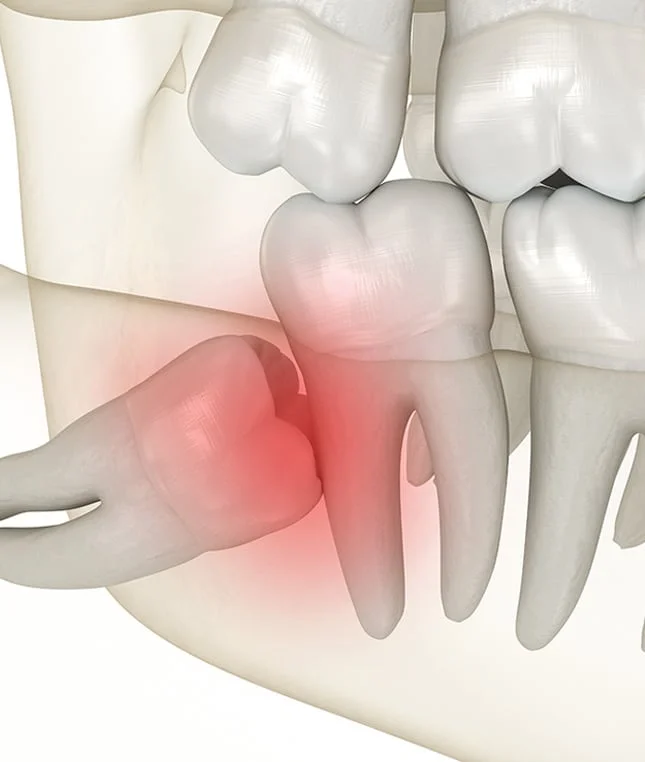Quick Facts About Wisdom Teeth Removal
- Reasons for Wisdom Tooth Removal: Pain, infection, impaction, bite or tooth alignment issues
- Average Procedure Length: 30-60 minutes
- Recovery Timeline: Mild swelling and discomfort for the first few days, with full recovery after approximately 2 weeks
- Cost: $140-400 per tooth
- Insurance Coverage: Many insurance plans offer benefits for tooth extraction
Wisdom teeth removal is a very routine dental procedure designed to extract the back molars, known as the “wisdom teeth.” This can become necessary when there is not enough space in the mouth for the wisdom teeth to emerge without shifting the surrounding teeth out of position. Removal of the wisdom teeth may also be recommended if they do not “erupt” properly and are trapped in the jawbone or gums, causing painful symptoms. Dr. Donian Shen, our experienced dentist, can remove your wisdom teeth to help alleviate these concerns or prevent them from happening entirely.
What Are Wisdom Teeth?
The wisdom teeth (third molars) are located in the back of the mouth and they generally erupt, or become visible, between the ages of 17 and 25. There are usually four wisdom teeth — two on the upper jaw and two on the lower — but some people only have one or two, and some individuals have none. Not everyone needs to have these teeth removed, but in many cases there are benefits to having the wisdom teeth extracted even if there is sufficient room in the mouth to house them.

When Should I Remove My Wisdom Teeth?
There are several situations wherein wisdom teeth removal may lead to a healthier bite or otherwise help prevent future dental concerns from developing. One of the most common reasons why patients have their wisdom teeth extracted is that their back molars are “impacted,” or lack the adequate room to break through the gums. Impacted wisdom teeth are common. Other reasons why your dentist might recommend wisdom teeth removal include cases in which the back molars grow at an angle rather than straight up, or otherwise become trapped and never erupt. Each of these situations can be the cause of discomfort, damage, and bite alignment issues.
Impacted or problematic wisdom teeth are typically more susceptible to cavities, decay, and other oral health issues. If your dentist notices that your back molars have the potential to cause concerns during a routine examination, a recommendation for future removal will be made. It’s important to regularly attend your semi-annual dental check ups so your dentist can observe how your wisdom teeth are interacting with the rest of your mouth. If removal is necessary, it’s generally best to extract the wisdom teeth sooner rather than later whenever possible.
Does Wisdom Tooth Removal Hurt?
Prior to having your wisdom teeth extracted, your dentist will administer local anesthesia to fully numb your mouth. During the extraction, you may be able to feel movement and pressure, but you should not experience any pain. Depending on whether or not your wisdom teeth are impacted, the extraction process may be more complex, leading to greater sensations of pressure during the procedure.
For patients who experience dental anxiety or who would like to feel even more relaxed during their procedure, we offer sedation dentistry options.
“My wisdom teeth so went smoothly and there were no problems post surgery. The Assistants and Doctors are so lovely and on point with communication. I would highly recommend Smile By Design.”
Sedation During Wisdom Teeth Removal
Wisdom teeth removal generally requires local or general anesthesia, depending on the complexity of your treatment. If dental procedures give you anxiety, we offer sedation dentistry options to help make you feel more comfortable:
Oral Conscious Sedation
Oral conscious sedation methods can help you feel more relaxed and calm prior to and during your treatment. This approach uses a small pill ingested before your procedure to reduce anxiety and produce a mellowing effect. Oral conscious sedation does not put you to sleep; however, most patients who receive this technique are unaware the procedure is being performed until it is over.
IV Sedation
Intravenous (IV) sedation can be well-suited for individuals with extreme dental anxiety and/or those who are undergoing intensive surgical procedures, such as complex wisdom teeth removal. With IV sedation (sleep dentistry), you will be completely asleep during the entire procedure. Throughout the process, your vital signs will be closely monitored to provide the highest level of safety.
How Much Does Wisdom Teeth Removal Cost?
Depending on the complexity of your procedure, wisdom teeth removal generally costs between $140 and $400 per tooth according to the Consumer Guide to Dentistry. Expenses associated with this tooth extraction procedure include sedation and x-ray fees, as well as the cost of any oral surgery necessities. Each person’s personalized quote will be unique, but removing impacted wisdom teeth is generally more costly when compared to molars that have already erupted.
It’s important to note that the national average listed above does not account for the factors unique to each person’s treatment plan, or the pricing differences across geographic locations. If you would like a cost estimate more personal to our practice, please don’t hesitate to contact our team. A friendly member of our office would be happy to relay information about pricing and insurance coverage.
In many cases, tooth extraction and wisdom tooth removal may be eligible for full or partial insurance coverage. Our team will be happy to help you review your plan and see what benefits you are eligible to receive.
We strongly advise patients to schedule regular follow-up appointments with Dr. Shen after wisdom teeth removal. If you have any questions regarding this procedure – including risks, complications, outcome, or another concern – we are happy to help. Contact us today for more information or to schedule a free consultation with Dr. Shen.*

